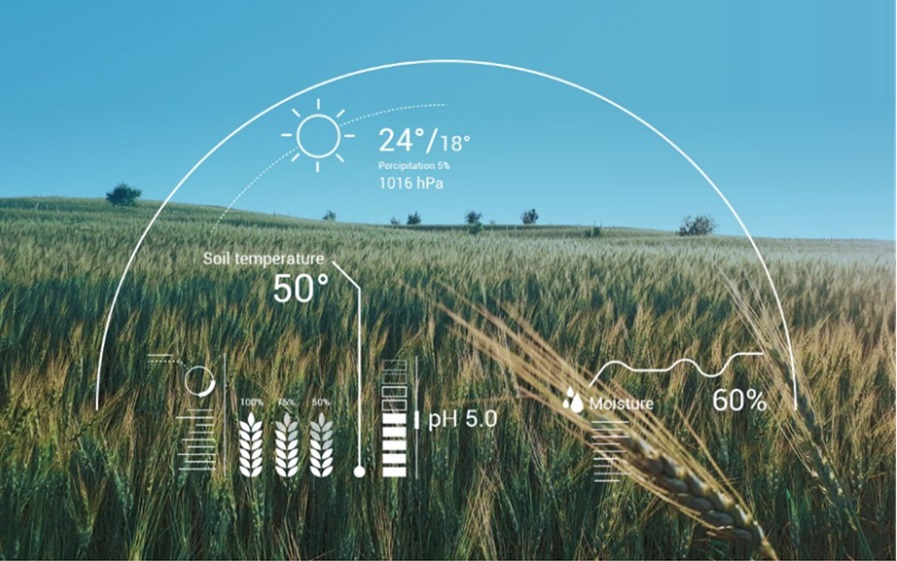Revolutionizing Agriculture: The Role of Artificial Intelligence
In the emerging world of modernization and urbanization, agronomists practicing agriculture are eager to undergo transformation in agriculture with artificial intelligence techniques owing to the shortages in manpower and the cost of employing laborers. In accordance with the enlarging population in the globe and the environmental factors, the insistence for impregnable, efficacious, long-term productivity enactment keeps on increasing. On inducing artificial intelligence (AI), an ultramodern potency that assures us to modify the topography of agriculture as everyone begins to deploy them in agriculture.
Harnessing the Power of Data
At the heart of AI’s impact on agriculture lies its ability to process vast amounts of data with unparalleled speed and precision. From soil composition and weather patterns to crop health and pest infestations, AI algorithms can analyze a myriad of factors to provide farmers with actionable insights in real time.
One of the most significant applications of AI in agriculture is predictive analytics. By analyzing historical data and current conditions, AI algorithms can forecast crop yields, identify potential risks, and optimize resource allocation. This predictive capability enables farmers to make informed decisions that maximize productivity while minimizing waste.
Precision Farming: Cultivating Efficiency
Precision farming represents a paradigm shift in agricultural practices, made possible by AI-driven technologies. By integrating sensors, drones, and machine learning algorithms, farmers can monitor and manage their fields with unprecedented precision.
For instance, drones equipped with multispectral cameras can capture high-resolution images of crops, allowing AI algorithms to detect signs of stress, disease, or nutrient deficiencies. Armed with this information, farmers can target specific areas for intervention, thereby minimizing the use of pesticides and fertilizers while optimizing crop health.
Similarly, autonomous tractors and robotic harvesters leverage AI to navigate fields, plant seeds, and harvest crops with unparalleled accuracy and efficiency. By automating labor-intensive tasks, farmers can reduce operational costs and increase overall productivity, all while minimizing their environmental footprint.
Sustainable Agriculture: Balancing Productivity and Ecology
In an age of climate change and dwindling natural resources, sustainable agriculture has become an imperative rather than an option. Fortunately, AI holds tremendous promise for promoting environmental stewardship while ensuring food security for future generations.
One example of AI-enabled sustainability is the optimization of water usage through precision irrigation systems. By monitoring soil moisture levels and weather forecasts in real time, AI algorithms can tailor irrigation schedules to match the specific needs of each crop, thereby conserving water and minimizing runoff.
AI-powered predictive modeling can help farmers mitigate the impacts of climate change by identifying resilient crop varieties and recommending adaptive farming practices. By anticipating shifts in temperature, precipitation, and pest populations, farmers can proactively safeguard their yields and livelihoods against environmental uncertainties.
Sustainable agriculture aims to harmonize productivity with ecological integrity, fostering a delicate balance between meeting human needs and preserving the environment for future generations. At its core, sustainable agriculture recognizes that soil health, water quality, biodiversity, and climate stability are essential components of a resilient and productive food system.
One key aspect of sustainable agriculture involves employing practices that minimize the use of synthetic inputs such as pesticides and fertilizers, opting instead for organic and regenerative methods. These methods prioritize soil health through practices like crop rotation, cover cropping, and composting, which enhance soil fertility and structure while reducing erosion and nutrient runoff.
Moreover, sustainable agriculture emphasizes biodiversity conservation by promoting the cultivation of diverse crops and the preservation of natural habitats within agricultural landscapes. By fostering diverse ecosystems, farmers can mitigate pest and disease pressures while providing habitat for pollinators and beneficial organisms.
In balancing productivity and ecology, sustainable agriculture recognizes the interconnectedness of environmental, social, and economic factors. By embracing practices that regenerate ecosystems, support rural livelihoods, and ensure food security, sustainable agriculture offers a pathway towards a more resilient and equitable food system for present and future generations.
While the potential benefits of AI in agriculture are undeniable, realizing this vision is not without its challenges. Access to technology, data privacy concerns, and regulatory hurdles represent significant barriers to adoption, particularly for smallholder farmers in developing countries.
Moreover, the reliance on AI carries inherent risks, including algorithmic bias, data security vulnerabilities, and unintended consequences for rural economies and communities. As such, it is imperative that policymakers, researchers, and industry stakeholders work collaboratively to ensure that AI is deployed ethically and equitably across the agricultural sector.
In conclusion, the integration of artificial intelligence into agriculture represents a transformative opportunity to address some of the most pressing challenges facing our food system. By leveraging technology to optimize productivity, enhance sustainability, and promote resilience, we can create a future where agriculture is not only more efficient and profitable but also more environmentally friendly and equitable. As we stand on the cusp of this agricultural revolution, the possibilities are as vast as the fields awaiting harvest.
Despite these challenges, the promise of AI in agriculture remains as compelling as ever. By harnessing the power of data, precision farming, and sustainable practices, AI has the potential to revolutionize the way we grow, harvest, and distribute food on a global scale.
Source

